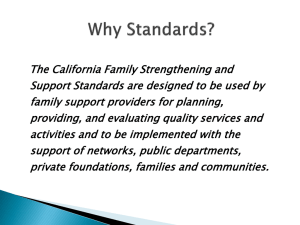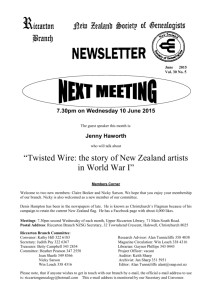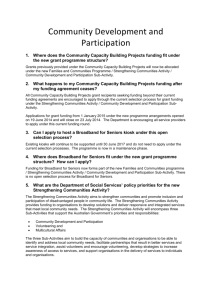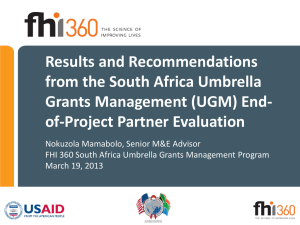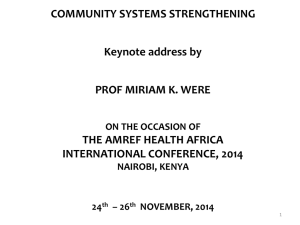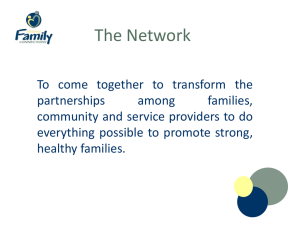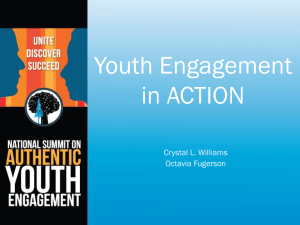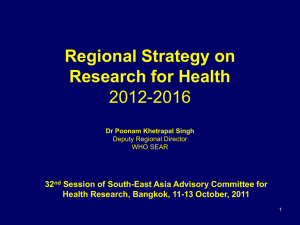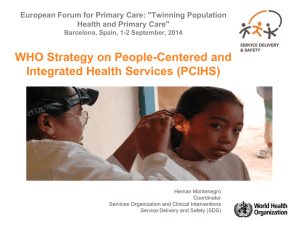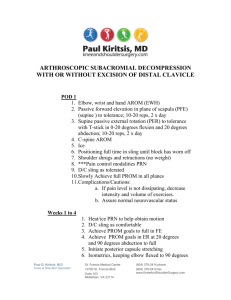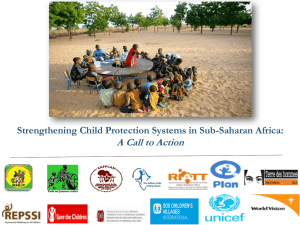Impact on local community
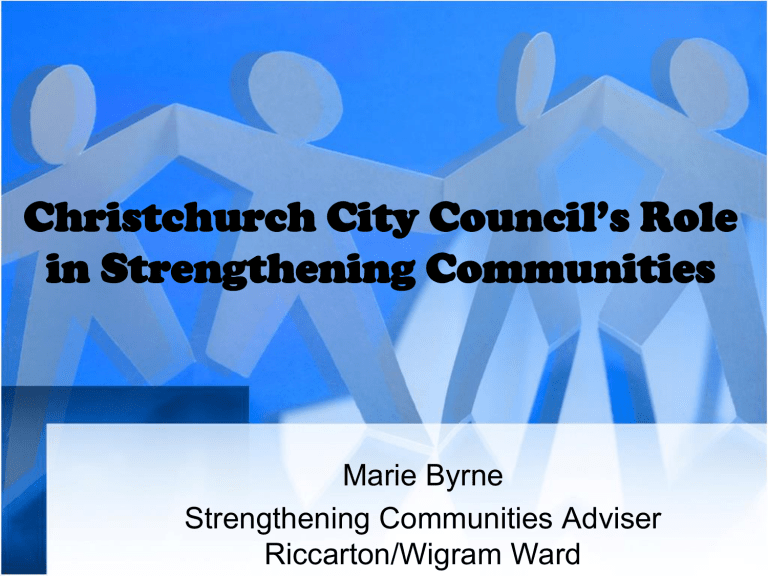
Christchurch City Council’s Role in Strengthening Communities
Marie Byrne
Strengthening Communities Adviser
Riccarton/Wigram Ward
Strengthening Communities
• Key Driver - Strengthening Communities
Strategy
• Key Driver - Three Year Plan
• Levels of Service
• Other Strategic Directions
– Ageing Together Strategy
– Youth Strategy
– Social Housing Strategy
Strengthening Communities Strategy
Eight Key Goals
• Understanding and documenting communities’ trends, issues and imperatives
• Promoting collaboration among key stakeholders, including government agencies, Maori, iwi and community and voluntary organisations, to identify and address community issues
Strengthening Communities Strategy
Eight Key Goals
• Enhancing engagement and participation in local decision-making
• Helping build and sustain a sense of local community
• Ensuring that communities have access to community facilities that meet their needs
Strengthening Communities Strategy
Eight Key Goals
• Increasing participation in community recreation and sport programmes and events
• Enhancing the safety of communities and neighbourhoods
• Improving basic life skills so that all residents can participate fully in society
Why Is Strengthening Communities
Important?
• Improves the bonds within a particular community
• Links to wider communities
• Increase of skills
• Build mutual understanding and trust
• Broaden community resources
Why Is Strengthening Communities
Important?
Strong Communities
• Have higher democratic participation
• Are cleaner and safer
• Have better educational achievement
• Have higher economic growth
• Have lower mortality rates
• Have a healthier environment
• Are more attractive places for people to live, visit and invest
Community Outcomes 2013-22
Strong communities underpin the achievement of Christchurch’s
Community Outcomes for 2013-22
•Good Governance
•Liveable City
•Strong Communities
•Healthy Environment
Strengthening Communities Adviser
Purpose of the Position
Supporting the various community sectors within local areas
Engage, mobilise, organise and build strong communities
Lead processes to stimulate local action on a sustained basis
Assist sectors work towards improved social, safety, wellbeing, cultural and quality of life conditions
Key Areas of Work
• Community Capacity Building &
Organisational Development
• Community Engagement
• Community Research, Analysis and
Strategic Planning
• Community Grants
• Project Management
• Community Networks and Partnerships
Strengthening Communities Teams
Northern Team
•Fendalton/Waimairi
•Shirley/Papanui
Eastern Team
•Burwood/Pegasus
•Hagley/Ferrymead
SouthWest Team
•Akaroa/Wairewa
•Lyttelton/Mt Herbert
•Riccarton/Wigram
•Spreydon/Heathcote
City Wide Team
•Disability
•Multicultural
•Youth & Children
•Arts
•Older Adults & Gender
•Maori Arts
Key Social Issues
The Ageing Population
• The median age in Christchurch is expected to be 41.4 years in 2021. This will be noticed even more when the baby boomers reach retirement age.
Impact on local community
– Increased need for programmes and activities for older adults
– Social isolation - varying needs dependant upon financial status and health status
– Increased need for social contact as many extended families are not living in the same city or are working longer hours
Key Social Issues
Multi-Cultural Communities
• There are over 150 different ethnicities living in
Christchurch. Riccarton has an increasing Asian population and Riccarton Wigram is made up of 6.7%
Maori and 2.5% Pacific
• Impact on local community
– Immigrants feeling disconnected from the community and unsure how to participate in decision-making that impacts on their lives
– Need to nurture communities to retain their culture and traditions for future generations
– Need to nurture understanding and respect of different cultures
– Need for encouraging integration and developing opportunities for people to learn about different cultures
– Isolation issues for elderly migrants
– Language barriers, accessing and understanding governmental and non-governmental services.
Key Social Issues
Decrease in Physical Activity
• From the Hillary Commission figures, 30% of 5-14 year olds in New Zealand are obese. The levels of activity appear to be falling in the western world and levels of obesity are rising in NZ (11% of the population in 1989 to 17% in 1997). This has huge health and social consequences.
• Impact on local community
– A multi-sectoral approach is required including health, recreation, sport and local government
– Increased need for activity friendly community planning i.e. walkways, parks, etc
– Increased need for targeted programmes for children aged 3-
12 years
Key Social Issues
Disabilities
• Worldwide, the number one disability in 2020 will be heart disease; the number two disability will be depression. One in five New Zealanders have a long term impairment and only 30% of people with disabilities earn over $15,000.
• Impact on local community
– Increased need for community services which support people to live independently
– Increased number of people feeling disconnected due to family, employment, health and safety issues
– Stigma for people with mental illness living within the community, because they are seen as different and ‘scary’
– Lack of resources for community organisations to deal with people with disabilities
Key Social Issues
Changing Family Dynamics
• The concept of the family changing with more parents, parenting alone and people with multi-families.
• Impact on local community
– The lack of male role models
– Time poor - More parents working longer hours
– Increased demand for affordable childcare / OSCAR programmes with the need for double income families
– Children having two homes and two communities
– Multiple families and financial implications to support two families
– Need for affordable support and education programmes and services for caregivers / whanau
– Need for targeted programmes and services for teen fathers and mothers
– Social Services gaps for Men.
Community Research, Analysis and
Strategic Planning
Respond flexibly to local trends and issues
• Community Profiles
– Profile Expo
– Vignettes
• Awareness of community trends
• Keeping up to date with latest research
– Research in to affect on social wellbeing by the migration of the population from east to west
• Providing advice on local issues to other
Council staff
– Community perspective – locally based
– Community Board perspective
Community Engagement
Promote and provide opportunities for communities to participate in Council decision-making processes at both city-wide and local levels
• Advising local community groups on
Council and other initiatives they can be involved in
• Organising & facilitating participatory processes
• Advising on engagement techniques
• Support deputations to Community Board
• Advising staff on local issues
Community Grants
Fund local community organisations and projects that align to Council’s strategic directions and relevant Council strategies
• Advising groups on funding options, assessing applications, writing & presenting reports, accountability
– Capital Endowment
– Strengthening Communities
– Small Grants Fund
– Discretionary Response Fund
– Youth Development Fund
Community Networks and Partnerships
Provide support and advice to local community groups to help them to become more effective with a focus on encouraging groups to work together collaboratively
• Facilitate six-weekly Riccarton networking meeting
– Held in Upper Riccarton Library,
Wednesdays 12-1pm
• Facilitate partnerships & collaboration between organisations
Community Capacity Building &
Organisational Development
Support capacity building of local community organisations
• Organisational capacity checks
• Supporting new community groups
• Meet with /support existing community organisations
Riccarton Community
• Low socio economic
• Higher proportion of renting
• Some long term residents
• Student accommodation – temporary residents
• High proportion of social housing
• High level of ethnic diversity
• Little community involvement and community ownership
Post Earthquake
• Increase in businesses – particularly in residential areas
• Higher rents – changing dynamics of neighbourhoods
• Higher levels of socialising – shifting of city centre to suburbs
• Frustration by residents – what about us?
– Riccarton West area
– Neighbourhood Policing Team
– Collaboration between organisations
– (Neighbourhood Support, NGO’s, Council,
Students)
• Neighbourhood Support Group meetings
• Common Ground Café
• Community Fun Day
• Mural
• Community Market
• Sports in The Park
• Street Cleanup
Positive Effects
• Community ownership - community-led solutions
• Decrease in crime
• Student involvement in local area
• Community Partnerships
Going Forward – Key Questions
• What part can university and student engagement play in strengthening our local communities?
• How can we promote a two way relationship between our local communities and the University that benefits both parties?
• How can our local communities become a learning environment in a way that benefits all stakeholders?
Thank You
• Marie Byrne
• Strengthening Communities Adviser
• 941 6502 marie.byrne@ccc.govt.nz
